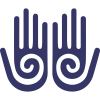Leon Chaitow explains the stress-pain connection in his book How to overcome pain.
“Stress affects both the body and the mind. Stress is the body’s reaction to a change – the stressor -that requires any physical, mental or emotional adjustment or response. Because stress can lead to, or aggravate, many forms of pain, we need to understand how it operates.”
According to Chaitow, stressors can be grouped into three main categories:
- biochemical – dietary imbalances, infection, allergies and environmental pollution for example
- biomechanical – over- or underuse of the body, poor posture and injuries
- psychosocial – emotional pressures, anxiety, fear, depression and so on)
Stress load and stress threshold
Usually it’s not just one of these affecting us. Any combinations of such stressors are called “stress load”.
“When we reach our stress threshold, the self-repair processes of our mind and body stop adapting adequately to the multiple stresses. Like a strip of elastic stretched too far and for too long, adaptation is no longer possible and our health is damaged.”, explains Leon Chaitow. “The good news is that just as a watch can be water proofed, so a person can – to a very large extent – be “stress proofed”.
By making conscious relaxation a part of your daily routine, you can encourage a process of habituation to chronic pain that will help you manage your experience of it.
“Our self-healing capability is enormous, and it is vital that we do not lose sight of this great gift”, says the author. “Our task when we are ill, or in pain, is to attempt to remove obstacles to recovery, to support and build up, as best we can, the multiple functions that make up homeostasis, and to avoid interfering with self-healing processes.”
Release your muscles to release your mind
When you experience constant or repetitive pain, or are anxious in any way, your muscles become tense, preventing easy relaxation. This inability to relax physically can create a vicious circle of ever increasing tension, fatigue, anxiety and pain. Here is what happens:
- Blood vessels that carry fresh, oxygenated blood into the muscle are constricted by the tightened tissue
- Waste drain away less efficiently
- We feel discomfort and stiffness
- Our breathing is affected
All these combine to create even more tension!
“In time, muscle tension can become habitual”, adds Leon Chaitow. “This physical unease can feed back to the brain messages that you are anxious or agitated, taking you still further away from a state of relaxation. You may reach a point at which you are no longer even aware of how tense your muscles are, and releasing them becomes increasingly difficult. This means that if you try to relax, the effect will probably be the opposite. You may tighten your muscles even more, because you will have forgotten what relaxation feels like. In such a situation relaxation has to be relearned.”
“It is crucial that you do find a way to rid yourself of tension, because only with the onset of relaxation can your body reverse the damaging hormonal processes that stress induces. Bringing about these positive biochemical changes will dramatically reduce your pain levels.”
Fortunately, there are many techniques that will allow you to both prevent and counteract the effects of excessive physical tension.
If you are not sure where to start, both Thai massage and yoga are excellent for releasing muscle tension and calming down the nervous system.
Related articles:
The pain gate mechanism: Massage’s role in overcoming pain
Now we know – posture affects your overall health
Photo by Hal Gatewood on Unsplash



